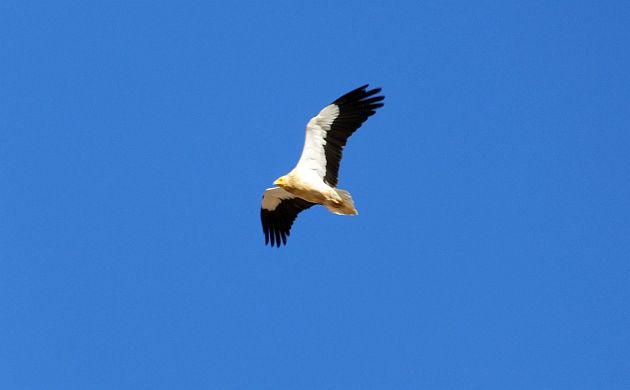
For those who happen to be faithful followers of posts about birding in Costa Rica, no, you haven’t accidentally browsed to the wrong place. Today, I am writing about another very birdy place and an event that I was very fortunate to have experienced, the Champions of the Flyway Bird Race in Eilat, Israel. It might not be Costa Rica, but it is one of the most important, birdiest events on the planet, and checking it out was a dream come true. It also happens to be the friendliest bird race because everyone is encouraged to share sightings and help each other out. Unlike other bird races where participants keep tight-lipped about bird species as mundane as a House Sparrow, this event gives a prize to the team that helps the most. In the world of bird races, this translates to messages about bird sightings and sharing all of that hard-earned scouting information. But isn’t all of that data sharing counterproductive for a bird race where the team with the most species wins?
Nope, not one bit.
The birding at Eilat is so dynamic in so many ways, you can’t just use that easy “gen” to zip over and see a Bar-tailed Lark, that Greater Spotted Eagle that flew overhead, or even the Wryneck hanging out in Eilat’s very own Central Park.
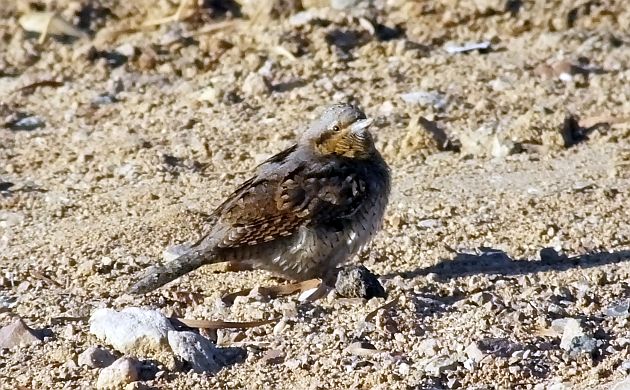
The Wryneck is one heck of a weirdo bird. This one was enjoying the ants in Central Park (just not the one where Pale Male ruled).
You could try to follow up every lead during a bird race but would end up wasting valuable time because in Eilat, Israel, birds are always on the move and the playing field is big enough to warrant very careful consideration concerning time management. Those updates may or may not help because some birds stay, many go, and even the resident desert species are natural-born nomads. Use the free gen, share your own, but plan accordingly (not to mention studying the birds beforehand).
The generous, friendly, loving nature of the Champions of the Flyway Race was one of the biggest highlights for me. In addition to that warm, fuzzy feeling, here are some other highs and lows from March 29th, 2016 in southernmost Israel:
No rain: Coming from deluge-prone Costa Rica, this was a personal highlight. No worries about being rained out in the early bird-song hours, no need to decide whether you should bring a poncho or umbrella! Not that I was racing but it was still nice to not even have to think about rain.
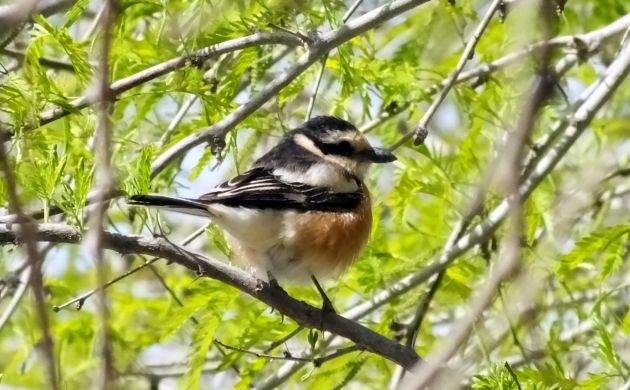
A lot of cool birds can be found way out there in the desert. This is a Masked Shrike.
Scouting for race day: Another high point, although this could also be viewed as a low point if scouted species pull a no-show on race day. This was why the count organizers stressed the importance of focusing on common birds. Migrants will be around but their hormone driven urges to get back to the breeding grounds for procreation make them less than reliable on count day. The high point of scouting was of course seeing a bunch of birds, something guaranteed at Eilat, especially during March.
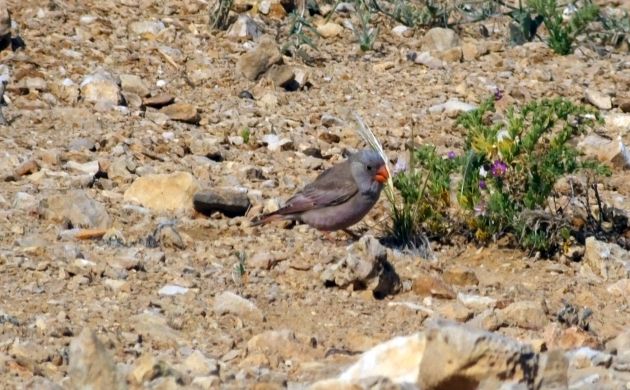
While scouting, we had really cool residents species like Trumpeter Finch,
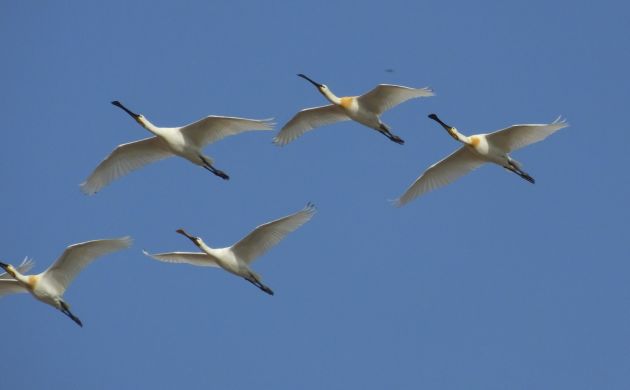
Eurasian Spoonbills,
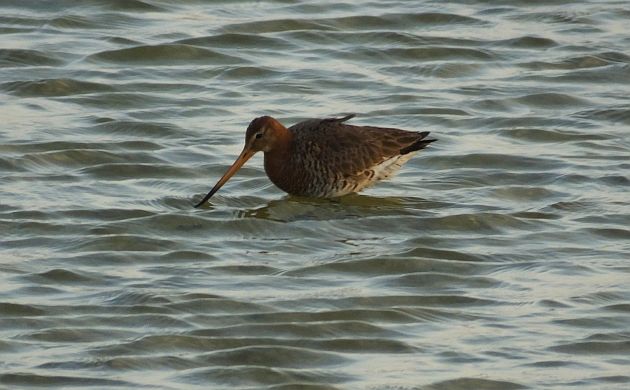
and shorebirds like this Black-tailed Godwit.
Raptor migration: More like rapacious bonanza, even those of us who have witnessed the Neotropical River of Raptors nearly fell out of our shoes when treated to several thousand Steppe Buzzards and Black Kites flowing overhead along with a healthy sampling of eagles, harriers, and other birds of prey! The best raptor flights actually took place before the main event- yet another bonus of scouting before race day!
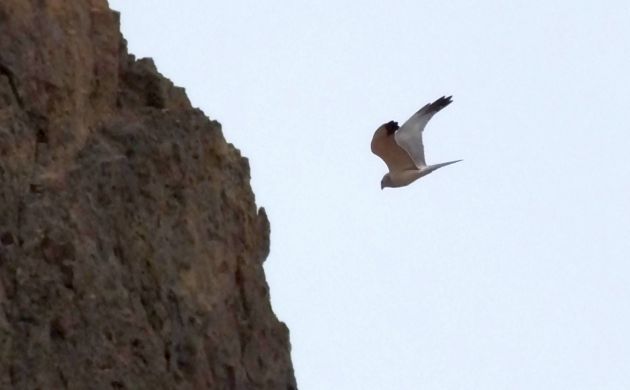
We saw several Pallid Harriers during our time in Eilat.

Lesser Spotted Eagle was also seen several times along with Steppe Eagle. This bird is a Lesser Spotted.
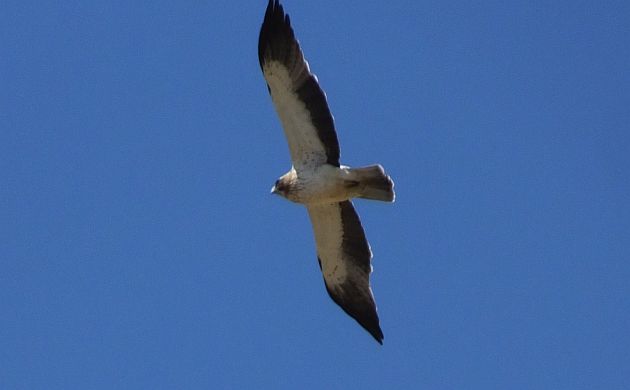
Booted Eagle- I had a hard time recognizing the dark morph of this one. I suspect that the dark morph mimics Black Kite and the pale morph Egyptian Vulture to help it sneak up on prey items.

Speaking of Egyptian Vulture…
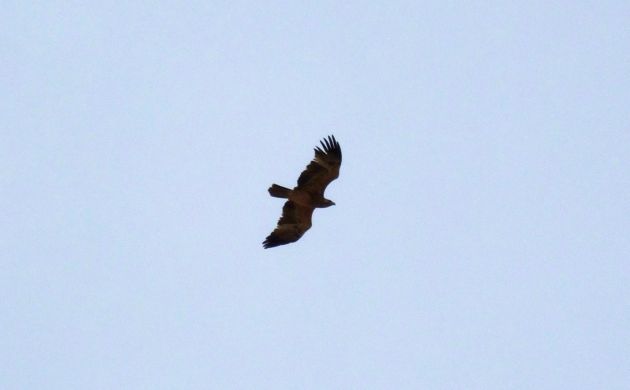
Eastern Imperial Eagle was pretty darn awesome too!
Seeing wheatears: We don’t see wheatears in Costa Rica, nor in Niagara county. I was very pleased to finally get my wheatear fill in the form of many Northern Wheatears, Isabelline Wheatears, Black-eared Wheatears, Mourning Wheatear, White-crowned Wheatear, and Desert Wheatear!
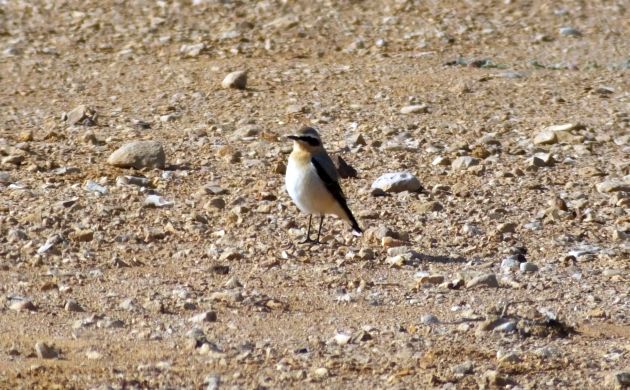
Northern Wheatears were pretty common at some sites.
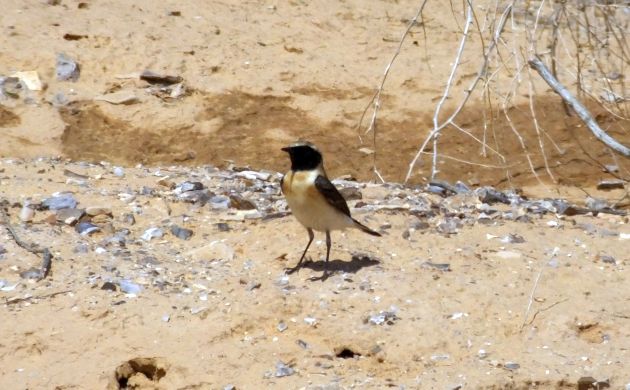
Black-eared Wheatear is a smart looking bird.
Thick-billed Lark: Not only is this lark really rare, it’s also one of the few that are easy to identify! No little brown bird here with some obscure tail markings or slightly larger bill. This guy has a serious beak, and obvious ID friendly markings. And we saw it! Yee haw. We also helped one or two other teams get this one on race day.
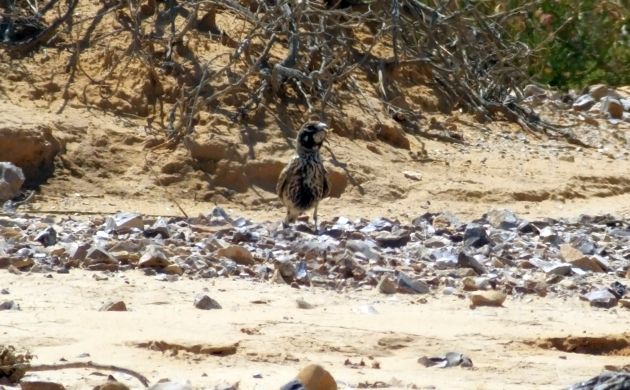
Thick-billed Lark!
Lichtensteins Sandgrouse: Say what? Yes, that really is a bird and it doesn’t have anything to do with a tiny country in Europe. Looking like a blend of pigeon, grouse, and feathered marble cake, this fast flying species zips to the edge of a small sewage treatment pond in Eilat right at dusk pretty much every night. On race day, over a hundred racers became silent, wide-eyed spectators as eight little sandgrouse suddenly appeared at our feet. The stars of the show looked at us, bobbed their heads, had a drink, and sped off into the darkening sky. At the bidding of count organizer, Jonathon Meyrav, we had arrived before dusk, took a seat on the rocky ground, and kept quiet when the birds came in. Sharing those special birds with so many like-minded people of all ages may have been the most magical experience on race day.
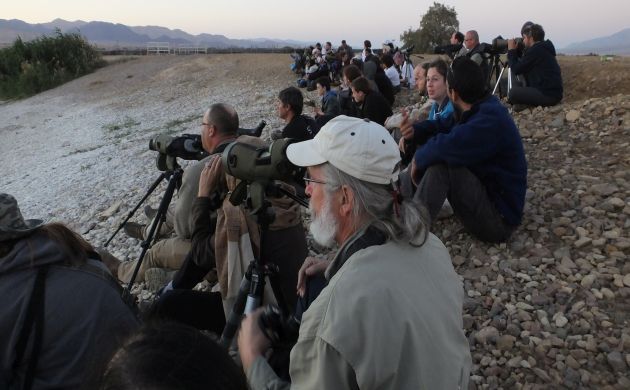
Waiting for the sandgrouse.
The Bus Writers team: Our unofficial team of journalists kept track of the bird species we encountered while running into the real teams on race day. Since we started at six instead of midnight, we didn’t get any owls, but we did get more sleep, made a stop at a delicious cafe, shared our meager sightings, and ended up with 116 species when the sun went down.
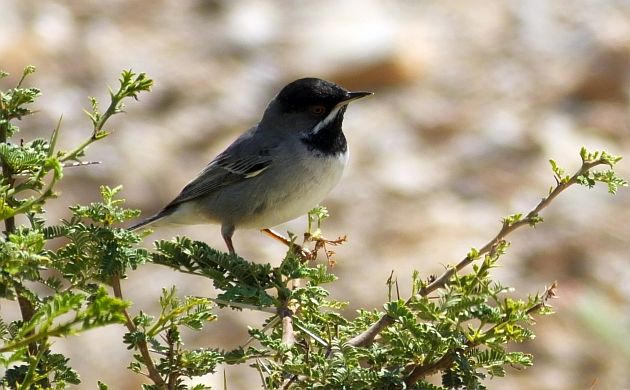
Ruppell’s Warbler was one of several species that gave fine looks in a desert wadi filled with birds.
Kids teams: Seeing so many young people participating in the race was a major high point. It was pretty clear that birding organizations in Israel have done a fantastic job at promoting birding, especially among young people. Having started birding at the age of 7 and wondering if other birders existed until the age of 11, I loved seeing so many young people with binoculars getting the support they deserve.
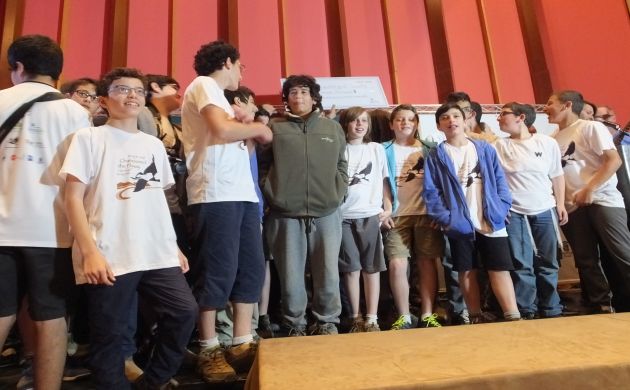
A small sampling of the many young birders who participated in the event.
Raising $67,000 plus for conservation!: The real reason for the Champions of the Flyway Bird Race is to raise money for desperately needed conservation efforts in the Mediterranean. And yes, the need is desperate. Uncontrolled hunting, commercial and otherwise, is threatening formerly species like Eurasian Turtle-Dove with extinction, and is taking a horrible toll on just about everything else including Blackcaps, Ortolan Buntings and even Eurasian Bee-eaters. Event organizers made it very clear that, sadly, some of the birds we saw (surreal, beautiful flocks of bee-eaters included) would certainly be gunned down, trapped, and slaughtered for food and sick “fun” once they flew out of Israel. The need to fight this ignorance was one of the main drivers behind the advent of the Champions of the Flyway Bird Race, and each year, funds raised with the race are given to an organization in the heart of the struggle. This year’s recipient was the Hellenic Ornithological Society (HOS) in Greece. For me, seeing the representatives from the HOS receive that fat check was the biggest highlight of the event.
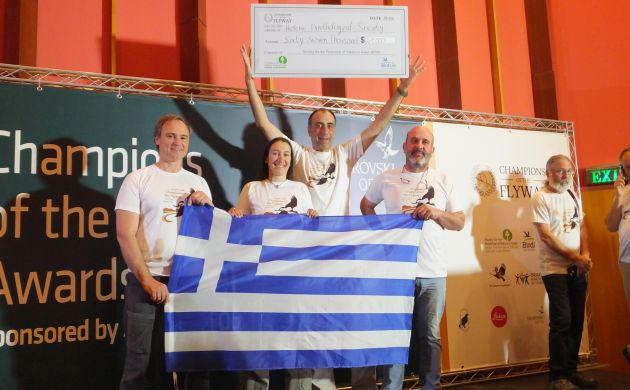
I can’t think of any low points from my time in Eilat, Israel. If I had to come up with one or two, they might take the form of staying just one week instead of two or three, and not being there when various falcons, Levant’s Sparrowhawks, and other May migrants pass through Eilat. I should also mention that Eilat was easy to visit, service excellent and professional, the cuisine likewise excellent, and the surroundings safe enough to visit with the entire family. Now to start working on finding sponsors for a team from Costa Rica…
My trip to Israel was sponsored by the Israeli Ministry of Tourism. #VisitIsrael!








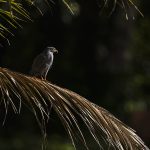

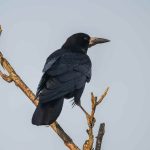
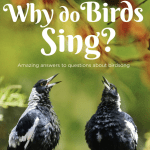

Awesome!! How great that you were able to unofficially run the race with other writers.
Yeah, it was pretty awesome. Our “race” was a far cry from the real thing but it was still nice to count and keep going as we checked on the teams.
Yet another reason for me to try to find a few weeks to take my in-laws up on that wedding-present trip they offered … thanks Pat (and Mike) for talking up Israel’s birding!
The Eurasian Spoonbills look incredible!
@Meredith- most definitely worth it. I would go so far to say that Eilat during spring migration should be on the top ten bucket list destinations of every world birder.
@Wendy- They were indeed incredible! They flew in across the Red Sea while we were watching from North Beach. Then they circled overhead a few times for full appreciation. Lots of birds do this at Eilat. That same afternoon, we had a Steppe Eagle and Lesser Spotted Eagle also fly in as well as Montagu’s Harrier, etc. and so on.
I’m not jealous. Really.
Really.
Me neither, Duncan. I’m totally cool.